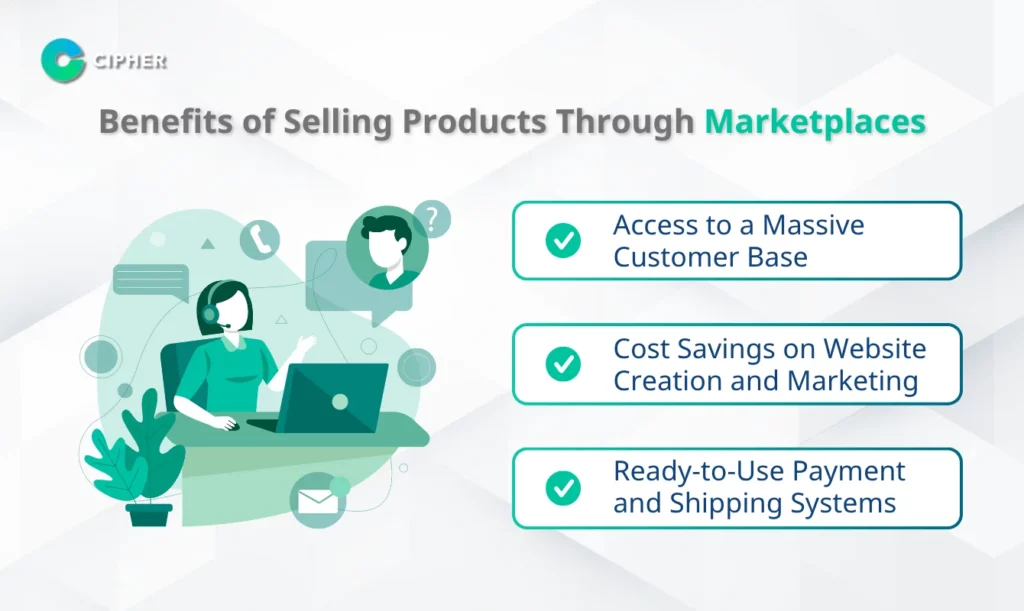Table of Contents
What is a Marketplace?

What Types of Marketplaces Are There?
Marketplaces are divided into several types, including:
- B2C Marketplace – Platforms that connect business sellers directly with consumers, such as Lazada, Shopee, Amazon
- B2B Marketplace – Platforms that facilitate buying and selling between businesses, such as Alibaba
- C2C Marketplace – Platforms that allow individuals to sell products to each other, such as Etsy, eBay
- Service Marketplace – Platforms for buying and selling services, such as Upwork, Fiverr
Differences Between Marketplaces and Traditional E-commerce
Marketplaces and E-commerce are similar in that they are both online sales channels, but what differentiates them is:
- E-commerce – The website owner sells products directly
- Marketplace – The website owner acts as an intermediary connecting multiple sellers with buyers, comparable to a large online market
Success Factors of Leading Marketplaces
Lazada Case Study
- Creates excellent shopping experiences for customers through search systems, payment methods, and fast delivery
- Continuous sales promotions such as flash sales, discount coupons, and free shipping offers
- Interesting marketing campaigns like Lazada 9.9 and Lazada Birthday
- Extensive expansion of seller networks with support and training to develop quality sellers
Shopee Case Study
- Uses gamification marketing strategies with games for coupon collection and discount codes, making shopping fun
- Flash Sale events with numerous discounted products, encouraging purchase decisions through time limitations
- ShopeePay payment system that’s convenient, fast, and secure
- Shopee Mall that brings together leading brands in one place, building buyer confidence
Amazon Case Study
- Establishes excellent service standards including Fulfillment by Amazon (FBA) and Amazon Prime that delivers products within 1-2 days
- Utilizes Big Data analysis to recommend products that appeal to buyers, creating personalized shopping experiences
- Creates product review and rating systems for buyers to evaluate products and sellers, increasing credibility
- Has Amazon Logistics system to deliver products nationwide quickly and on time
Benefits of Selling Products Through Marketplaces

Access to a Massive Customer Base
Leading marketplaces have enormous customer bases visiting daily, giving your products the opportunity to be seen and purchased by many customers. Meanwhile, your own E-commerce site might take years to build such a customer base.
Cost Savings on Website Creation and Marketing
Creating your own E-commerce website, including various systems, marketing, and SEO, all come with high costs. Marketplaces have already prepared these things, so you only need to register as a seller to start selling immediately.
Ready-to-Use Payment and Shipping Systems
Marketplace Marketing Strategies for Online Sellers
Interested in Online Marketing Services for Marketplaces? Use Cipher Services Today!
Summary
Leading marketplaces like Lazada, Shopee, and Amazon are online platforms for buying and selling products that have gained the highest popularity. With massive visitor numbers and sky-high sales, many online E-commerce stores have turned to compete on these marketplaces. To succeed, you should find online marketing experts like Cipher as partners to develop marketing strategies and operate systematically, leveraging experience and deep understanding of marketplace mechanisms to help your store have the highest chance of success above other competitors on leading marketplaces.
Frequently Asked Questions About Marketplaces
What Marketplaces are in Thailand?
The most popular marketplaces in Thailand include:
- Shopee – The 1 E-Commerce platform in Southeast Asia, where Cipher has special expertise
- Lazada – Pioneer of Online Marketplaces in Thailand, featuring LazMall that brings together famous brands in one place
- Konvy – An Online Marketplace for beauty products
- Chilindo – A platform selling Korean products
What Does Market Place Mean?
Market Place refers to E-Marketplace, which means a large online market platform that serves as an intermediary connecting many buyers and sellers. Buyers benefit from selecting diverse products, comparing prices, and reading product reviews, while sellers benefit from high customer traffic, increasing their chances of making sales.
What is a Marketplace Business?
A marketplace business creates an online market platform to make it easier for buyers and sellers to connect. The platform itself doesn’t sell products but earns revenue from commissions, advertisements, and additional services. Examples of such businesses beyond Shopee and Lazada include service marketplaces like Uber, Airbnb, and Agoda.
Does Selling on Marketplaces Cost Money?
Generally, marketplaces collect commissions from successful sales. Commission rates vary across platforms, and some may have entrance fees. However, if you can sell a large volume of products, the income earned is usually worth the money spent, without having to invest in creating your own website. Nevertheless, achieving high sales might require additional marketing investments such as buying ads on the marketplace, doing SEO, or running promotions. These should be considered as business operating expenses beyond commissions.
Selling products on leading marketplaces isn’t easy. You need knowledge and understanding of their mechanisms, know how to use various marketing tools effectively, and plan your sales systematically. If you want to succeed and compete with numerous other stores, consulting experts like Cipher will help reduce obstacles, save time, and increase your opportunities to generate substantial income on marketplaces.





